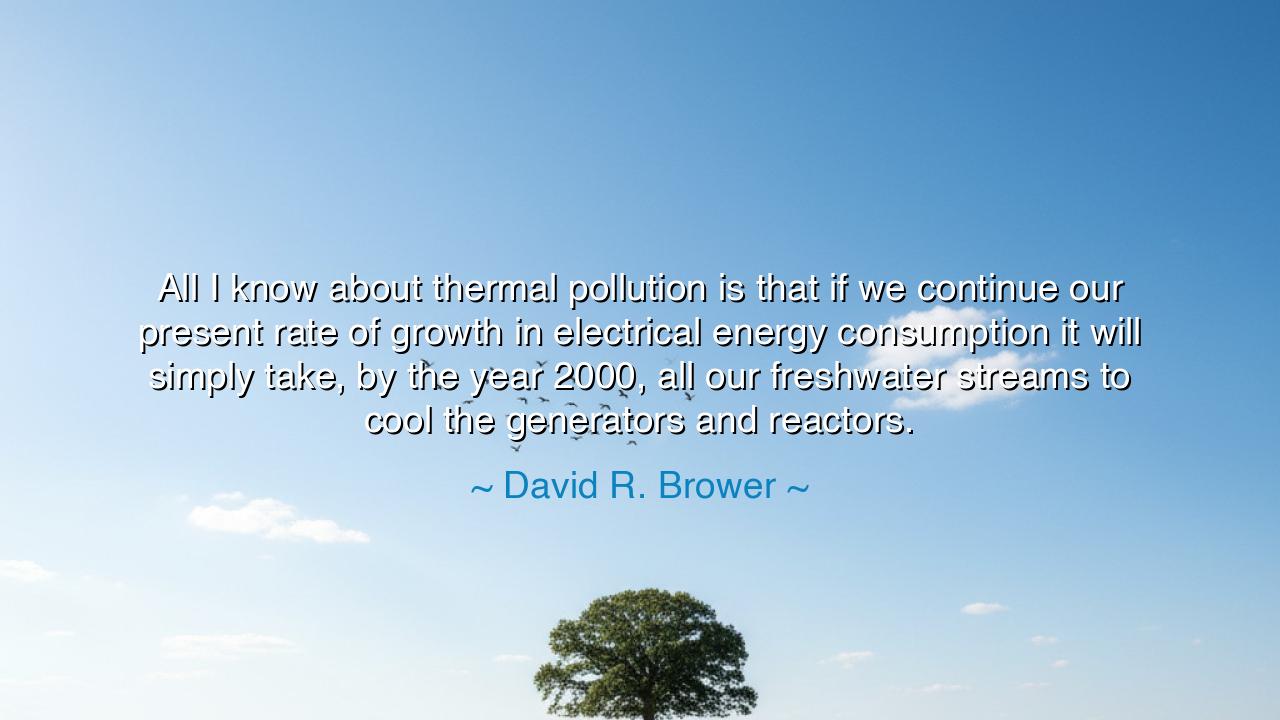
All I know about thermal pollution is that if we continue our
All I know about thermal pollution is that if we continue our present rate of growth in electrical energy consumption it will simply take, by the year 2000, all our freshwater streams to cool the generators and reactors.






"All I know about thermal pollution is that if we continue our present rate of growth in electrical energy consumption it will simply take, by the year 2000, all our freshwater streams to cool the generators and reactors." These words from David R. Brower serve as a stark warning about the dangers of unchecked progress and unsustainable growth. Brower’s reflection on thermal pollution speaks to a deep, growing concern for the balance of nature—a balance that, once disrupted, could lead to catastrophic consequences for both the environment and the creatures that depend on it, including humanity itself. Brower’s words, though specific to his time, are timeless in their call to action—the urgency to reconsider how we interact with the world around us before it is irreparably altered.
In the ancient world, the concept of balance in nature was a recurring theme. The Greeks believed that the cosmos was governed by natural laws, and that all living things had a role to play in maintaining the harmony of the universe. Heraclitus, the philosopher of change, taught that the world is in constant flux, but that within this change, there is an underlying order that must be respected. Disrupting this order, he warned, could lead to imbalance and suffering. In a similar way, Brower’s words remind us that our rapid growth, particularly in energy consumption, is disrupting the natural order of things—an imbalance that, if left unchecked, could lead to environmental collapse.
The ancient Romans, too, had a keen awareness of the interconnectedness between human progress and nature’s resources. The construction of aqueducts and roadways was a monumental achievement, but the Romans also recognized the need to conserve water and resources to ensure the longevity of their empire. Cicero, the great statesman and philosopher, wrote about the importance of stewardship over the natural world. He understood that unchecked consumption would lead to scarcity and degradation. His belief in sustainable growth aligns with Brower’s message—that the present actions of humanity should be guided by wisdom and foresight to prevent future suffering.
Consider the story of the Maya civilization, which flourished for centuries in Central America. At its peak, the Maya built vast cities and developed advanced systems of agriculture. However, their success was not without consequences. Overuse of the land, deforestation, and environmental degradation ultimately led to the decline of their civilization. The Maya understood the cycles of nature, but their actions eventually disrupted those cycles, contributing to their fall. Like Brower’s warning, the story of the Maya is a lesson in the dangers of overconsumption and the failure to maintain balance with the natural world.
Brower’s words resonate with wisdom from the past, reminding us of the impermanence of human achievements when they are built upon the exploitation of nature. As ancient peoples understood, the natural world is not a limitless resource—it is a fragile system that must be respected and maintained. Just as the Greeks and Romans understood the need for balance, so too must we recognize that the relentless pursuit of growth, without regard for the environment, will eventually lead to a crisis that no amount of human ingenuity can solve.
The lesson that emerges from Brower’s quote is one of stewardship and responsibility. Thermal pollution, like many environmental issues, is a result of human arrogance and exploitation of the earth’s resources. To ignore the consequences of our actions is to deny our role in the greater cosmic balance. Just as the ancients revered the natural world and understood their duty to protect it, we, too, must learn to act with foresight and wisdom. The future will be shaped not by our ability to harness power, but by our ability to manage that power responsibly and sustainably.
In practical terms, the call to action is clear: we must begin to change the way we interact with the earth. Invest in renewable energy, reduce waste, and strive for sustainable growth that considers the health of our ecosystems. Educate ourselves and future generations about the impact of our actions on the world and recognize that progress cannot be measured solely by technological advancement, but by how we live in harmony with the natural world. Brower’s warning is not just a plea for environmental protection—it is a call for wisdom, urging us to look beyond our immediate needs and to act with an awareness of the long-term consequences of our choices.
Let us remember the ancient wisdom that balance is key, and that true progress lies not in growth for its own sake, but in growth that respects and preserves the natural world for generations to come. Just as the ancients saw themselves as part of a greater cosmic order, so must we see ourselves as stewards of the earth, bound by the responsibility to protect its delicate balance for the future. Merciless though the laws of nature may seem, they are not beyond our understanding or control, but only if we act with awareness, respect, and foresight. The future is in our hands, and it is our duty to ensure it is one that transcends mere consumption and fosters a lasting, sustainable relationship with the earth.






AAdministratorAdministrator
Welcome, honored guests. Please leave a comment, we will respond soon